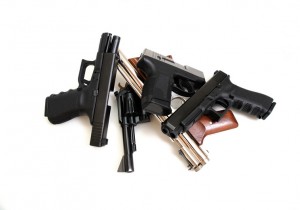“The situation is unacceptable and the ones who suffer the most are first and foremost Arab civilians,” says Inspector General Roni Alsheich.
 The level of crime and the number of illegal firearms in the Arab sector is unacceptable and a plague upon the lives of Israel’s Arab citizens, National Police Commissioner Insp.-Gen. Roni Alsheich said Tuesday.
The level of crime and the number of illegal firearms in the Arab sector is unacceptable and a plague upon the lives of Israel’s Arab citizens, National Police Commissioner Insp.-Gen. Roni Alsheich said Tuesday.
“The situation is unacceptable and the ones who suffer the most are first and foremost Arab civilians, and afterwards the other sectors of society. There is a very powerful desire in the Arab sector to strengthen the police work there, and over the decades we haven’t done this.”
Alsheich’s comments came during a committee meeting held at the Knesset as part of a day-long salute to police held by the parliament during which Alsheich also laid out some of his goals as commissioner.
According to Israel Police figures from 2015 presented by Alsheich, although Arabs make up only about 21 percent of the population of Israel, 59% of murders and 55% of attempted murders take place in the sector.
In addition, 58% of arsons, 47% of robberies and 32% of property crimes reported to police are in the sector, according to the figures.
Alsheich said police should recruit academics from within the Arab sector who can help them find ways to better carry out policing there, as part of what he described as his wider goal of increasing the agency’s ability to carry out “multicultural policing” that takes into account the unique needs and concerns of each separate community.
Increasing the number of police officers working in the Arab sector would also help improve their understanding of the needs of the community, he said.
Alsheich also spoke in a wider sense about plans to unveil a new national policing policy that will tailor performance goals to the needs of each particular station and community as opposed to adhering to nationwide goals and standards.
Under the plan, each station will compile an assessment of its priorities and major problem areas to be presented to the commissioner.
Only after this step is completed will performance goals be set by police.
The commissioner also addressed the poor public perception of the police, saying that repairing that image will be one of his major goals.
“Our challenge is that citizens won’t cross the street when they see a cop coming” and that they will feel more comfortable coming to the police to issue complaints, he said.
The approach is in keeping with statements made last week by Public Security Minister Gilad Erdan, who described how police will adopt multicultural policing, in keeping with a study commissioned from the RAND Corporation.
Addressing Alsheich, MK Revital Swid (Zionist Union) said: “The loss of public faith in the police is where the problems begin.”
Swid, a former criminal attorney, also drew issue with the recently passed “stop and frisk” law that will increase the freedom of police to execute searches on civilians.
The ceremony to honor the police was initiated by MK Mickey Levy (Yesh Atid), the former commander of the Jerusalem District of the Israel Police.
“Recently the police have been badly rattled and have suffered from serious public criticism,” said Levy, who added that many “have forgotten the 30,000 officers who served in the police force with sacrifice and courage.”



“There is a very powerful desire in the Arab sector to strengthen the police work there, and over the decades we haven’t done this.”
Why indeed haven’t they?
Now, this is a situation where I might agree with you right wingers here.
The Arabs have enough arms to float a few divisions in the Galilee.
Almost every Arab male has a gun. Not a pretty picture.
More shockingly, they often get their guns from Israeli organized crime.
There are ways to drive by scan for weapons.
Show up unannounced in a truck in Umm al Fahm, and scan for weapons.